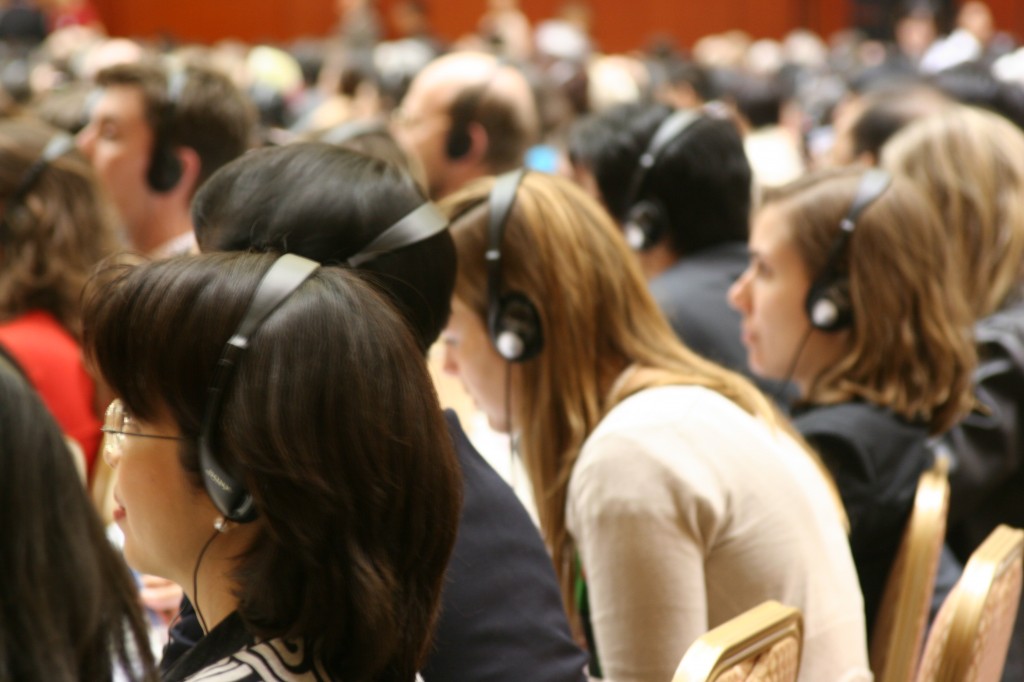Dear Negotiators
Posted on 08. Oct, 2010 by annac in United Kingdom
Dear negotiators,
I thought I would take the time to write to you as we approach the end of this session in China. I was sitting in this beautiful convention centre getting more and more frustrated with the way things are going, so I thought instead of stewing by myself I should really do something constructive. I don’t think this letter will come of the blue for you as I’ve been sat in the sessions (well those you let me in to), so i’ve heard your frustrations too and they match many of my own.
Here in China we all seem to be pretty dispairing with the fact these negotiations are not achieving the results we need to see. In fact I (along with many of you I think) would hesitate to even call these negotiations, since we are actually discussing very little of substance here.
It’s crazy! But it doesn’t have to be this way. That’s why I wanted to write to you, sometimes when you are inside the process you struggle to see where things are going wrong. As an observer I hope I can maybe take a step back and then help you to see where the problems lie.
I think I’m well qualified for the job because I’ve spent a lot of time in the UK working with groups who use a concensus model of decision making. Therefore I know how difficult it can be, but I also know that there are some simple things you can do to help the process move along. I’d like to share these with you now.
First. Be in the room. An obvious one you may think but I can assure you that even if you are doing it many of your fellow negotiators are not. I won’t name names but one rather large developed country was seen to speak first in a contact group yesterday then promptly get up and leave without so much as a g’day mate. If you are not even in the room how do you expect to feel part of the dicussion and be invested in the final outcome?
Second. Listen. It is important that we all listen to what each other has to say, I know this may also seem obvious, however just to remind you this means actually paying attention to what people are saying and not flicking through your blackberry when others are speaking. It means thinking about what others are saying and not merely what you are going to say next.
Third. It would help if you could show active encouragement for good suggestions and think about how you can modify your positions to encorporate them. In the consensus models I am familiar we we do this by a twinkling of our fingers, perhaps you could try that?
Fourth. Don’t speak if all you are going to do is repeat the same thing you have been saying for years. It’s not constructive and it wastes time, see the above point for how you can avoid doing this in the future.
Lastly. Think about the model of decision making we are using. The point of concensus decision making and the only way it will work is if you put aside individual gains for the good of the whole group. Concensus works when this happens. You may feel like you have had to compromise, but so will everyone else, and that’s what consensus is, collective compromise. Consensus aims to get us to a solution that everyone feels they have had an input in. Consensus allows us all to be heard in the hope that the result will be a decision we are ALL invested in and therefore will ALL work with.
In our case here this means putting aside your individual economic gains and working for the good of our planet and all the people who live here. When you work in this way you will see that, though the decision making process is still not easy, we should be able to start moving again as you find points of agreement.
I hope these tips will help you to see that it is not the process which is failing, merely the way we are using the process, the way you are working within it. To this effect I would like to finish with some last words of advice. You see being here, a young female at the UN I can’t help but notice that we are rather dominated by white males at the (if you don’t mind me saying) rather older end of the spectrum. Though we have 192 countries represented here the dominant way of working definately conforms to the white male majority I see in the halls.
To help us work in these circumstances constructively it would be good if you took the time to think about this diversity (or lack there of), not just in terms of who is in the room but also in terms of the way you work when you are in the room.
To start these thoughts flowing I have attached a very useful set of rules calles tools for white guys to this letter. If you could take the time to read them, and them and think about working with them, I think we could really start to get things moving here.
Because after all that is what we all want right? None of us want this to go on forever, we all have better things to do than spend the rest of our lives in these convention centres, and we would all like to feel we have achieved something great here. That all the sleepless nights were really worth it.
That the future will be better because we were here.
So please think about what I have said and come to Cancun in December ready to work. Prepared to work in a way that will allow us to achieve the first step on the path to the amazing and beautiful future that IS in our grasp.
Yours with hope,
Anna
Tools For White Guys
1. Practice noticing who’s in the room at meetings - how many men, how many women, how many white people, how many people of color, is it majority heterosexual, are there out queers, what are people’s class backgrounds. Don’t assume to know people, but also work at being more aware.
2a. Count how many times you speak and keep track of how long you speak.
2b. Count how many times other people speak and keep track of how long they speak.
3. Be conscious of how often you are actively listening to what other people are saying as opposed to just waiting your turn and/or thinking about what you’ll say next.
4. Practice going to meetings focused on listening and learning; go to some meetings and do not speak at all.
5a. Count how many times you put ideas out to the group.
5b. Count how many times you support other people’s ideas for the group.
6. Practice supporting people by asking them to expand on ideas and get more in-depth, before you decide to support the idea or not.
7a. Think about whose work and contribution to the group gets recognized.
7b. Practice recognizing more people for the work they do and try to do it more often.
8. Practice asking more people what they think about meetings, ideas, actions, strategy and vision. White guys tend to talk amongst themselves and develop strong bonds that manifest in organizing. This creates an internal organizing culture that is alienating for most people. Developing respect and solidarity across race, class, gender and sexuality is complex and difficult, but absolutely critical - and liberating.
9. Be aware of how often you ask people to do something as opposed to asking other people “what needs to be done”.
10. Think about and struggle with the saying, “you will be needed in the movement when you realize that you are not needed in the movement”.
11. Struggle with and work with the model of group leadership that says that the responsibility of leaders is to help develop more leaders, and think about what this means to you.
12. Remember that social change is a process, and that our individual transformation and individual liberation is intimately interconnected with social transformation and social liberation. Life is profoundly complex and there are many contradictions. Remember that the path we travel is guided by love, dignity and respect - even when it is bumpy and difficult to navigate.
13. This list is not limited to white guys, nor is it intended to reduce all white guys into one category. This list is intended to disrupt patterns of domination which hurt our movement and hurt each other. White guys have a lot of work to do, but it is the kind of work that makes life worth living.
14. Day-to-day patterns of domination are the glue that maintain systems of domination. The struggle against capitalism, white supremacy, patriarchy, heterosexism and the state, is also the struggle towards collective liberation.
15. No one is free until all of us are free.










Wow, I don’t think I’ve seen any serious effort made at the UN to consider anti-oppression tactics in negotiations. I think you just hit on a radical opportunity my friend.
Really nice blog, again! Please send it to the delegates you know, and copy and paste their answers! :-)
This is awesome.